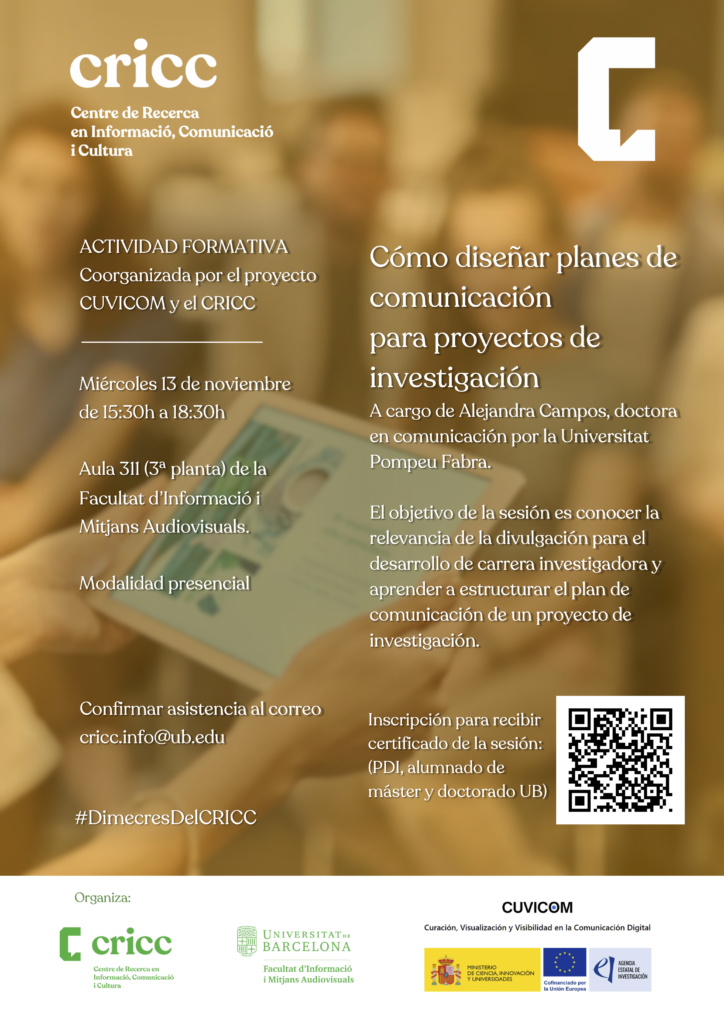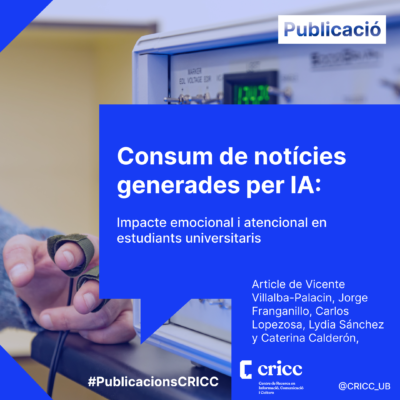How to design communication plans for research projects
– Wednesday, November 13 from 15:30h to 18:30h
– Room 311 (3rd floor) of the Faculty of Information and Media
– By Alejandra Campos, PhD in communication from the Universitat Pompeu Fabra.
IMPORTANT: the activity is recognized by the IDP. Therefore, it is necessary to register here. This recognition is open to the teaching and research staff, as well as to UB master and doctoral students.
Public agencies that fund research expect grant recipients to be able to communicate what initiatives the public money is being invested in, what research is being done, what results are expected and what progress is being made. Currently, projects that are financed with public funds, such as European projects, require a communication plan, both in the proposal phase to be funded and during implementation. Seeking to maximize the impact of a research project by planning effective communication ensures a multiplication of public investment. In reality, communicating should be assumed as part of the social responsibility of a research career. However, it is not common to obtain training on how to communicate the research in which we participate.
In this workshop we will explain why it is so important for researchers to approach science outreach as part of their regular activities. At the same time, we offer a conceptual method to simplify the approach to this activity that will effectively promote both the projects in which we participate as well as multiply the future possibilities of collaboration and promotion of any research career. For this purpose, the schedule will be as follows:
– INTRODUCTION: Presentation of the trainer and the structure of the course.
– PART 1: Public policies, competitive public funds and social responsibility.
– PART 2: The impact of science projects.
– PART 3: Impact multiplier activities: communication, dissemination and exploitation of results.
– PART 4: SCICOMM-Tool: A 10-question tool for creating, planning and strategic communication plans for research projects. The communication cycle in the search for impact.
– PART 5: Examples of good and bad communication practices. Comments, questions and doubts from the attendees.
The seminar will consist of a presentation of the fundamentals and conceptual methodology SCICOMM-Tool that facilitates strategic planning for effective communication of research projects. Some illustrative practical examples of activities and methods will be given. Participants will be invited to use the SCICOMM-Tool conceptual tools to create a first design of a communication plan for the CUVICOM project or other use case.
About the instructor:
Alejandra Campos holds a PhD in communication from Pompeu Fabra University (UPF) and is a senior advisor in international competitive projects at the Universitat Autònoma de Barcelona (UAB). She holds a degree in information systems from the University of Buenos Aires (UBA), a degree approved as a computer engineer by the Spanish Ministry of Science and Innovation. In addition to her specialization in European projects, Dr. Campos has also specialized in the study of project communication requirements established by the EU for project approval.
Given the growing concern of the European Union to improve the communication of research to broad non-expert audiences, including the general public and the media, Dr. Campos has studied the communication of science and innovation of European projects, as one of the three key activities in the search for the impact of public investment in research. For more than 10 years she has been advising researchers in the presentation of competitive proposals for public funding, from where she has been able to observe the complexity that it represents for the research community worldwide, especially for non-experts in communication, to communicate their scientific activities to society, the media and other non-expert agents.








